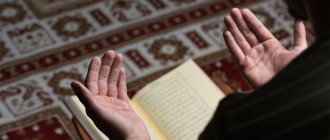The basis of Islam is the Koran - a book of revelations sent to the Prophet by Allah himself. The Koran is a collection of covenants and recommendations for every Muslim believer, who is obliged to withstand all earthly tests with honor in order to ascend to heaven after death and reunite with Allah in Paradise. Only daily prayers can help Muslims with this.
Warnings
- Ask for success both in this life and the afterlife. You cannot ask for punishment and death for someone. You should not curse a person or animal. You cannot curse Muslims or non-Muslims for any reason, or curse illness or bad weather (all this is from Allah). You also cannot ask through dead people (whoever they may be).
- You should not make dua with the words: “this rain was given to us by such and such a star” and so on. You should not make dua against family members and relatives or ask for anything sinful.
The Virtues of Prayer
According to Islam, dua is one of the greatest forms of worship, but some Muslims do not fully realize this and do not pay enough attention to it, although dua is the strongest connection between man and God. Dua has many advantages:
- Allah Almighty instructs Muslim believers to turn to Him with a prayer: “ Your Lord said: “Call to Me, and I will answer you ” (Sura Ghafir (the Forgiving), verse 60);
- prayer is the worship of Allah Almighty, and the Prophet Muhammad ﷺ directly said this in one of the hadiths: “ Dua is worship ”;
- with the help of dua, Allah Almighty saves the believer from troubles and misfortunes;
- Allah Almighty is always close to those believers who turn to Him.
Quran about dua
In Surah Al-Baqarah of the Holy Quran, Allah says: “ So remember Me and I will remember you ,” which implies that those who turn to Allah with prayer, according to Islam, will be heard by Allah and rewarded. Also in the Holy Book of the Quran there is a verse that contains the words of the Almighty that those Muslims and Muslim women who often remember Allah will receive forgiveness and reward from Him.
Also in one of the verses of Surah Al-Araf it is reported that one should remember Allah silently, with fear, humbly and quietly, in the morning and in the evening.
On every day
Performing namaz is a rather complex ritual, consisting of some actions of the person praying (bows, turning the head, positioning of the hands) and reading the prayer itself. Children are taught this from an early age, and an adult, for example, one who has recently converted to Islam, must also touch upon the correct performance of prayer.
For all believers there is a single prayer in Russian, which can be read at any time:
“O Allah! We appeal to Your help, ask to lead us along the right path, ask You for forgiveness and repent. We believe and rely on You. We praise You in the best possible way. We thank You and do not deny You. We reject and leave (leave) all those who commit lawlessness. Oh my God! We worship You alone, we pray and bow to the ground before You. We strive and direct ourselves towards You. We hope for Your mercy and fear Your punishment. Verily, Thy punishment befalls the atheists!”
This prayer can be used by those Muslims who are not yet sufficiently familiar with prayer.
After prayer read:
“O Allah, help me to remember You worthily, to thank You worthily and to worship You in the best way.”
Definition of the term "dua"
Defining the term “dua,” al-Khattabi said: “The meaning of the word “dua” is a request from the Lord for care and help. The essence of dua is identifying the need for the Almighty, cleansing oneself of strength and power (that is, admitting that one is powerless to do anything good or leave something bad), this is a sign of slavery and a notice of one’s weakness, as well as praise to the Almighty and understanding of His generosity and generousity.”
فقال الخطابي: “معنى الدعاء استدعاءُ العبدِ ربَّه عزَّ وجلَّ العناية َ، واستمدادُه منه المعونةَ. وحقيقته: إظهار الافتقار إلى الله تعالى، والتبرُّؤ من الحول والقوّة All rights reserved. "
The Almighty says: “So remember Me (by performing prayers, making dua, etc.) and I will remember you (I will reward you)” (Surah Al-Baqarah, verse 152).
(سور) ة البقرة آية 152)
In another verse, the Almighty says (meaning): “Indeed, Allah has prepared forgiveness and reward for Muslims and Muslim women who often remember Allah” (Surah Al-Ahzab, verse 35).
... َثِيرًا وَالذَّاكِرَاتِ أَعَدَّ اللَّهُ لَهُمْ مَغْفِرَةً وَأَجْرً ا عَظِيمًا (سورة الأحزاب آية 35)
In another verse, Allah says (meaning): “And remember your Lord to yourself, humbly and with fear and quietly in the mornings and evenings, and do not forget to remember Allah (Surah Al-Araf, verse 205).
Read also: What is a traffic quota on MTS
الْجَ هْرِ مِنَ الْقَوْلِ بِالْغُدُوِّ وَالْآصَالِ وَلَا تَكُنْ مِنَ الْ غَافِلِينَ (سورة الأعراف205)
How to make a dua to Allah correctly and what to do to make it heard?
When turning to the Almighty with a prayer, a believer must be absolutely convinced that Allah will hear his request and answer, as the Prophet Muhammad ﷺ said: “ Call on Allah, being confident of the answer... ”.
It will be correct if the servant of Allah turns to his Creator sincerely with all his heart, asks with all his soul, and does not show carelessness while making dua . A Muslim should always pray to the Almighty, regardless of the situations and circumstances in his life.
Recommendations
Dua should begin with the praise of the Almighty and a prayer for peace and blessings on the Messenger of Allah Muhammad ﷺ.
If a Muslim wants his dua to be heard and answered, then the believer should follow a number of rules and do the actions required for this:
- It would be correct to turn to the Almighty at those moments when the prayer is most often accepted;
- You should not deliberately rhyme the dua;
- a Muslim must be in ablution,
- turn to Allah Almighty with a request and express your helplessness and inadequacy before Him;
- show sincerity when addressing Allah Almighty;
- the prayer should be made with the conviction that it will be accepted by Allah, and the Muslim should be decisive in his requests;
- a Muslim should be persistent, but he should not rush things;
- when a Muslim makes dua, he should be humble;
- a Muslim should turn to the Lord not only in moments of trouble, but of joy;
- the prayer should be said out loud, but it should not be done loudly;
- a Muslim must, when turning to the Almighty, confess his sins and ask Allah for forgiveness;
- the believer must acknowledge that Allah Almighty has endowed him with benefits, and give Him praise for these benefits and express gratitude to Him;
- dua can be offered to Allah Almighty three times;
- when pronouncing dua, it is advisable for the believer to turn towards the Kaaba;
- Dua should be asked first for yourself, and then move on to requests for other people;
- Islam instructs a Muslim to address the Almighty using His most beautiful names, epithets, and one can also address oneself through the good deeds of the person praying;
- Islam prescribes that the person asking to be in clothes that were obtained in a permitted way during the prayer, and to consume food and drink that were also obtained in a permitted halal way.
What is the right time for dua?
A Muslim believer should prefer to make dua such places and times, as well as such situations that are most favorable for the Almighty to accept a person’s prayers:
- this is the time of the Night of Destiny or “Lailat-ul-qadr”;
- the time of the last third of the night, tahajudda;
- this is the time immediately after the five obligatory daily prayers have been performed;
- this is the time between the pronouncement of adhan and iqama;
- this is the time when it rains outside;
- a time when non-Muslims clash with Muslims;
- this is the time when a Muslim drinks Zamzam water if he has a sincere and pure intention;
- this is the time when a Muslim makes prostration or sujud;
- when a Muslim makes a prayer after going to bed after ablution, but gets up again in order to turn to the Almighty for help;
- when a Muslim makes dua, and during prayer says the following prayer: “La ilaha illa anta subhanaka inni kuntu mina-zzalimin”;
- after at-tahiyat and salawat on the Prophet Muhammad ﷺ are read;
- when one Muslim reads dua to him in the absence of another Muslim;
- if the prayer is said on Mount Arafah on the day of Arafah, that is, on the tenth day of Dhul-Hijjah;
- during the month of Ramadan;
- if a person who has been oppressed makes a supplication against his oppressor;
- if parents make a prayer for their children;
- if a traveler makes a prayer;
- if a fasting person makes a prayer before breaking his fast;
- if a dua for help from Allah is made by a believer who is in a situation of extreme need;
- if a just ruler makes a prayer;
- if a good child makes a prayer for his parents;
- after ablution;
- during the Hajj.
Tasbihat (glorifying the Lord)
The Prophet Muhammad (peace and blessings of Allaah be upon him) said: “Whoever, after prayer, says “subhaanal-laah” 33 times, “al-hamdu lil-layah” 33 times and “Allahu akbar” 33 times, which makes the number 99, equal to the number of names of the Lord, and after that he will add to one hundred, saying: “Laya ilyayahe illya llaahu wahdahu la sariikya lyah, lyahul-mulku wa lyahul-hamdu, yukhyi wa yumiitu wa huva 'alaya kulli shayin kadiir”, he will be forgiven [small] errors, even if their number is equal to the amount of sea foam”[39]. Performing “tasbihat” belongs to the category of desirable actions (sunnah). Tasbihat sequence
Whose duas may Allah not answer?
“A man on a long journey, with disheveled hair and covered in dust, will raise his hands to the sky, crying, “Oh, Lord! Oh Lord! But his food is haram, his drink is haram, and he was raised on haram. So how will his dua be accepted?”
(Muslim, zakat: 19; Tirmidhi, tafsir: 3)
A person’s bad deeds reduce the strength of his dua, so it is very important to do as many good deeds as possible so that they cover up the bad ones, and then your dua will be stronger and rise very high. In other words, the strength of your dua directly depends on you, on your position before Allah. From your sincerity and faith in what you do.
How many times do you need to read dua and can you do it without ablution?
The strength of dua to Allah is not determined by the exact number of readings; it is acquired through sincere and diligent service to the Lord.
There is no indication how many times to read the prayer. But Hadiths talk about texts that repeat a certain number:
- Tasbih after hza Namaz - 33 times.
- Surah from the Koran al-Ikhlas – 3 times.
- Istighfar – 70 times a day.
In Islam, Namaz is read after ritual ablution; it is forbidden to perform it if one is not able to Janabat (means complete ablution after sexual intercourse).
Namaz: rules
In Islam there is a main prayer - Namaz. With its help, a person can maintain a spiritual connection with Allah. According to the covenants of the Prophet, every Muslim believer must read prayer at least 5 times a day:
- Irtenge - early in the morning
- Oyle – in the middle of the day
- Ikende – in the afternoon
- Akhsham - at sunset
- Yastu - at dusk.
Reading Namaz helps Muslims strengthen their faith in the Almighty, cope with earthly temptations, and cleanse their souls of committed sins. Before prayer, a person must perform the ritual of ablution and appear before his Creator absolutely clean.
If possible, a person should perform namaz in a room specially designated for this. The Quran should be stored in a place where there are no other objects above it.
Men and women should pray separately from each other. If for some reason it is necessary to pray together, then the woman does not have the right to pray out loud. Otherwise, a man will listen to a woman’s voice, and this will distract him from communicating with Allah.
The most powerful prayer is considered to be the prayer performed in the Mosque. But you can perform namaz in any other place, since this ritual is considered obligatory. The Azan calls all Muslims to begin prayer. During prayer, believers should face Mecca, the holy city for all Muslims.
There are a number of rules and conditions according to which namaz must be performed:
- Ritual purity. A person has the right to begin prayer only after ablution.
- Clean place. Namaz can only be performed in a cleaned room.
- Clean clothes. To perform Namaz, a person must be dressed in clean clothes. Clothes must be used to cover the aurat - parts of the body that Muslims are required by Shariah to cover during prayer. For men, this is part of the body from the navel to the knees, and for women, it is the entire body, except for the feet, hands and face.
- Sobriety of mind. It is unacceptable to pray while under the influence of alcohol or drugs. In general, alcohol and drugs in all Muslim countries are haram (sin).
Features of performing dua for women
Islam has a special attitude towards women and their religious duties. The same goes for dua. How to do it correctly for a woman?
To the conditions listed above, one must add that dua can be done during days when other types of worship are prohibited. These days include menstruation and postpartum cleansing. In addition to dua, types of worship such as wird, dhikr, salawat and reading Islamic literature are also permitted.
Every Muslim believer who tries to fulfill religious instructions must know how to correctly make a dua to Allah so that it is accepted by the Almighty.
Kinds
There are many duas that came from the hadiths of the Prophet Muhammad ﷺ, compiled into special collections. In them, the Prophet ﷺ addressed certain words to Allah in any given situation or under certain circumstances.
In the list below you can learn and read about the following duas:
- for trade;
- Istikhara prayer (when a choice has to be made or a decision has to be made);
- on every day;
- on the road;
- for cleaning the house;
- tajnama;
- after prayer;
- before bedtime;
- for the deceased;
- after azan;
- from debts;
- for a successful marriage;
- morning;
- before and after meals;
- subhanaka;
- Yasin;
- Prophet Yunus;
- to get pregnant;
- frequent duas of the Prophet ﷺ;
- istighfar (at repentance);
- ganjul arsh;
- Mashlul;
- from laziness;
- to successfully pass exams.
How to read correctly?
The day of every Orthodox person should begin with the prayer text “Our Father”. These words are supposed to be read before going to bed. Christians resort to them before meals and before any important undertaking.
The sacred words “Our Father” protect a person from the machinations of Satan and evil spirits, from damage and the evil eye. This prayer strengthens the physical and moral strength of a Christian, cleanses the soul and heart of bad thoughts and deep resentments.
Rules for reading the prayer:
- For God, it does not matter in what language the prayer words are pronounced, so you can read the text in both Old Church Slavonic and modern Russian.
- What is truly important is the mood of the person praying and the impulses of his soul.
- If a mistake was made during prayer or a person misspoke, then you need to start reading again, saying “Lord, have mercy on me.”
What happens if you read it every day?
Regular recitation of dua improves the quality of life of the person praying. Texts help you implement your plans every day:
- give strength of spirit;
- improve health;
- lift your spirits;
- protected from dangers.
A person becomes closer to what he wants, which strengthens his faith. Growing confidence in the constant support of God consolidates achievements, makes us move forward, work on new desires, and pray more diligently.
Anyone who reads the dua every day receives round-the-clock protection. Constant sincere praise of Allah with a request for help guides you on the righteous path, gives you the necessary power, correct thoughts, and energy.
Daily fivefold prayer - how to perform it correctly
All prayers in Islam - namaz - are unique and inimitable - accordingly, they are read differently. However, there is something common in the five prayers - for example, before each prayer it is necessary to cleanse the body and mind, renounce everything earthly, directing all thoughts and actions only towards the Almighty.
- The morning prayer of Fajr is short, consisting of two sunnat rakats, as well as two fard rakats. Fajr is read at dawn, before sunrise.
- The midday Zuhr prayer consists of four sunnat rakats, four fard rakats, and two additional sunnat rakats, recited at the end of the fard. Regardless of the place of reading, zuhr is read silently. On Friday, instead of Zuhr, Juma prayer is read.
- The afternoon Asr prayer is read in the afternoon and consists of four sunnat rakats and four fard rakats. The fard of this prayer is always read silently, regardless of the place of reading. Read before sunset.
- The evening Maghrib prayer consists of three fard rakats and two sunnat rakats, read after completing the fard. Read after sunset.
- The night prayer of Isha consists of four rakats of sunnat, four rakats of fard, two more rakats of sunnat and the final three rakats of witr from the book of the Koran. Reads until midnight.









